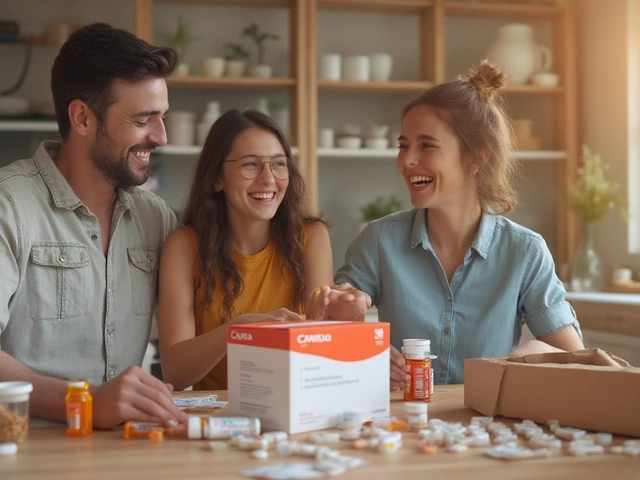
Walk into any neurology clinic and you’re bound to hear about carbidopa-levodopa. For decades, it’s been the go-to treatment for Parkinson’s disease. If you or someone close to you has Parkinson’s, chances are this medication is already part of the daily routine. But science never stops, especially where quality of life is on the line.
Right now, researchers are rethinking old ideas and testing brand new ones. Clinical trials aren’t just happening in some distant lab—they’re pushing real solutions closer to people every day. Wonder what all those trial headlines mean for you? You’re definitely not alone. Sometimes it can feel like there’s a new study or drug update every other week, and it’s hard to tell what’s hype and what’s helpful.
If you want to keep up, it helps to know how carbidopa-levodopa works, why new research matters, and how fresh findings might actually change day-to-day life. Whether you’re curious about new delivery methods, long-acting formulas, or potential side effects being tracked, understanding the basics gives you control and confidence. Ready for a breakdown of the latest buzz and how it ties back to real people? Let’s get into it.
When people talk about carbidopa-levodopa, they’re really talking about the combo that changed Parkinson’s treatment in a big way. Levodopa, the main player, turns into dopamine once it’s in your brain. Since Parkinson’s hits the cells that make dopamine, this gives your body what it needs to smooth out those shaky symptoms.
But here’s the catch: if you take levodopa on its own, your body breaks most of it down before it even reaches your brain. That’s where carbidopa steps in. It blocks that breakdown, helps more levodopa get through, and cuts down on nasty side effects like nausea. In simple terms, you get more bang for your buck with this duo.
Most doctors still call carbidopa-levodopa the "gold standard" for a reason. Studies show that about 75% of people with Parkinson’s see a big improvement in movement and stiffness when they use it. If you’re curious how it stacks up compared to some other treatments, take a look at this quick breakdown:
| Treatment | Main Benefit | Common Side Effects |
|---|---|---|
| Carbidopa-Levodopa | Fast, strong relief of Parkinson’s symptoms | Nausea, low blood pressure, movement swings |
| Dopamine Agonists | Longer-acting, less "wearing off" | Sleepiness, swelling, impulse issues |
| MAO-B Inhibitors | Milder symptom help, can be added to main meds | Headache, joint pain |
Most folks start with carbidopa-levodopa and stick with it for years, though doctors sometimes add other meds or tweak doses as the disease changes. Pills aren’t the only choice anymore, either. There are dissolvable tablets, extended-release forms, and even intestinal gel pumps for folks who can’t swallow pills or need steady control.
Bottom line: this combo isn’t just “old school”—it’s the foundation everything else gets compared to. Pretty much every new Parkinson’s treatment gets tested against carbidopa-levodopa first to make sure it actually makes a difference. If you or someone you know has Parkinson’s and takes this med, you’re not alone—it’s the most commonly prescribed strategy worldwide.
It’s easy to think of clinical trials as something that only matters to doctors or researchers, but the reality is different. Every single thing we know about carbidopa-levodopa today—how it works, how much to take, when to take it—comes from clinical trials. Trials are where new ways to use this medication get put to the test. Without them, treatment would be stuck in the past.
Take this for example: clinical trials found that combining carbidopa and levodopa helps prevent nausea and makes the treatment more effective. That’s not just a random benefit; it’s the result of years of careful testing. And if you’re hearing about new delivery forms, like patches or infusions, or about tweaks to dosing that reduce those annoying off-periods, that’s all coming straight from clinical trial data.
People usually care about trials for three main reasons:
Here’s a quick look at some hard numbers from recent studies involving clinical trials and carbidopa-levodopa:
| Year | Focus of Trial | Main Finding |
|---|---|---|
| 2022 | Extended-release form | Reduced 'off' time by 43 minutes/day |
| 2023 | Pump-based delivery | Improved mobility in 65% of participants |
For people living with Parkinson’s, these changes aren’t just numbers. They can mean less time struggling with symptoms and more time living a regular life. And if you ever wonder why your doctor recommends a certain dose or brand, you’re probably seeing the impact of somebody’s clinical trial in action. So, paying attention to clinical trial news keeps you one step ahead—whether you’re interested in new treatment options, want to join a study someday, or just want to understand the "why" behind your care plan.
If you feel like you’ve heard it all about carbidopa-levodopa, think again. Scientists are constantly fine-tuning how this mainstay drug is used because its benefits are huge, but so are the challenges. The main problem? After a few years on carbidopa-levodopa, many people notice the medication wears off too soon or leads to unwanted movements called dyskinesias. That’s where new research steps in to shake things up.
One hot research area is extended-release formulas. These are designed to keep drug levels steady in the body, so you don’t get those annoying “on-off” swings. For example, Inbrija (a levodopa inhaler) and Duopa (a gel pump) give people new ways to get the medication, especially when swallowing pills just isn’t working well anymore. Clinical trials are looking at how these versions change daily symptoms and long-term side effects—some of these trials have shown people spend more time moving easily and less time frozen or shaky.
Researchers are also digging into new combinations and add-ons. A big focus right now is pairing carbidopa-levodopa with drugs that tweak dopamine in different ways or block enzymes that break it down too fast. This can boost the main drug’s punch without cranking up the side effects. You might see drug names like opicapone or safinamide in study summaries—these are add-ons aiming to give people a smoother ride through their day.
Another cool update: researchers are finally paying attention to individual differences. Not everyone responds to carbidopa-levodopa the same way, so newer studies look at genetics, gender, and even gut health. Some studies suggest that a person’s microbiome (the bacteria in your gut) might affect how well this drug works. This could lead to super-personal treatment plans soon.
Here’s a quick look at some of the research directions and what they’re trying to solve:
Check out this snapshot of recent extended-release and alternative delivery research:
| Innovation | Main Benefit | Status |
|---|---|---|
| Inbrija inhaler | Rapid relief during “off” episodes | Approved, increasing use in clinics |
| Duopa gel pump | Smoother control, fewer daily pills | Widely used, ongoing studies |
| Opicapone add-on | Boosts levodopa effect, extends duration | Recent FDA approval, more trials |
Bottom line: the research pipeline for carbidopa-levodopa is packed with promising ideas. Anyone using this medication has good reasons to keep an eye on what’s coming next.

There’s a lot of action right now in the world of carbidopa-levodopa research. Scientists aren’t just sticking with the basics—they’re testing new ways to make this medication work better and last longer. Instead of just taking more pills, the big goal is to help people cut down on those “off” times when symptoms break through.
One hot area involves new delivery systems. Some trials are looking at inhaled carbidopa-levodopa (like the product Inbrija), which could kick in quicker than regular oral tablets when symptoms sneak up. Others are studying longer-acting tablets or even gel infusions (like Duopa) that deliver steady medication directly to the gut, which helps smooth out the unpredictable ups and downs people often face with Parkinson’s.
It doesn’t stop there. Researchers are also:
Some trials zoom in on people in early versus late stages of Parkinson’s disease to see who benefits most from each type of product. For instance, the 2023 EASE LID 3 trial focused on how well new formulas controlled involuntary movements, a stubborn problem with long-term levodopa use.
If you’re a numbers person, here’s a quick snapshot of just a handful of ongoing or recent studies:
| Trial Name | Type | Main Focus | Status (2025) |
|---|---|---|---|
| Inbrija (CVT-301) | Inhaled formula | Rapid symptom relief | FDA Approved |
| Accordion Pill | Extended-release | Reduce "off" time | Phase 3 done, awaiting results |
| Duopa | Device/gel | Continuous delivery | FDA Approved, ongoing studies |
| IPX203 | Novel oral capsule | Longer-lasting control | Late-stage trials |
Long story short, scientists want to make carbidopa-levodopa do more with less fuss. If you’re struggling with unpredictable symptoms or side effects, keeping up with this research could help you talk with your doctor about trying something new—maybe sooner than you think.
It’s easy to miss out on the latest news about carbidopa-levodopa and clinical trials, but you don’t have to scroll for hours or get lost in medical jargon. There are simple ways to keep yourself in the loop and even get personally involved if you want to.
First off, make friends with reliable sources. Trusted places like the Michael J. Fox Foundation and Parkinson's Foundation post regular updates and explain research news in plain English. Even the ClinicalTrials.gov database lets you search for trials using plain keywords like "Parkinson’s" or "carbidopa-levodopa." Their alerts and newsletters can send info right to your inbox, so you don’t have to go hunting for it.
If you’re considering joining a clinical trial, ask your doctor. Participation isn’t just for big city patients—lots of trials offer remote check-ins or cover travel for those living farther out. Trials aren’t just about testing new pills either; some are looking at new delivery options for carbidopa-levodopa (like under-the-tongue films or intestinal pumps), or ways to improve daily life by tracking symptoms more closely with apps.
Here’s a quick look at what happens if you raise your hand for a clinical trial:
Fun fact: As of early 2025, there are over 150 active global studies for carbidopa-levodopa and related treatments. That’s more than twice as many as five years ago, proving the area is buzzing with new ideas. And if you try a patient-reported outcomes app, you could help shape the research just by logging how you feel each day.
The next few years could seriously shift the way carbidopa-levodopa is used for Parkinson's disease. While pills have always been the most common form, new delivery options are taking the spotlight in recent clinical trials. Patches, pumps, even inhalers—these could help smooth out those annoying motor ups and downs people experience as the disease progresses.
Scientists are working on long-acting versions of carbidopa-levodopa that might need fewer daily doses. Imagine swapping six or seven pills a day for one patch that slowly releases the medication. There’s also a lot of buzz around infusions delivered right into the intestines through a small pump, which keep levodopa levels steady and may reduce side effects like dyskinesia.
Another big focus is finding ways to personalize how much and when you take your meds. Apps and wearable tech could track symptoms in real time and let your doctor tweak your treatment faster. Data from a 2024 trial even showed that using digital symptom trackers helped patients report fewer “off” periods by almost 20% compared to those using old-fashioned paper logs.
| Delivery Method | Status | Possible Benefits |
|---|---|---|
| Transdermal Patch | Phase 2 Trials | Steady dose, fewer pills |
| Intestinal Infusion Pump | Phase 3 Trials | Reduces fluctuations |
| Inhaled Levodopa | Recent FDA Approval | Fast relief of “off” episodes |
And here’s something hopeful: some researchers are testing new compounds that could slow Parkinson’s progression, so carbidopa-levodopa isn’t just chasing symptoms all the time. While nothing has made it past clinical trials yet, the fact that these studies exist is a pretty big deal for everyone looking beyond the same old routine.
If you or a loved one uses carbidopa-levodopa, staying up-to-date with clinical trial news isn’t just about tomorrow’s treatments. Sometimes, patients who join trials get access to the latest therapies before everyone else. Want to be part of that future? Websites like clinicaltrials.gov and major Parkinson’s foundations update studies weekly—just check in and ask your neurologist if anything new fits your situation.
In the contemporary landscape of Parkinson’s therapeutics, carbidopa‑levodopa remains the keystone upon which myriad clinical strategies are constructed. The pharmacodynamic synergy between levodopa’s dopaminergic precursor capability and carbidopa’s peripheral decarboxylase inhibition has been elucidated through rigorous biochemistry, thereby establishing a mechanistic foundation that is incontrovertible. Subsequent investigations have delineated the temporal pharmacokinetic profile, demonstrating that maximal cerebral concentrations are achieved within a predictable window following oral administration. Moreover, the clinical literature consistently reports that approximately three‑quarters of patients experience a substantive amelioration of motor rigidity and bradykinesia, a statistic that demands recognition in any policy formulation. It is imperative to acknowledge, however, that long‑term exposure engenders the phenomenon of “wear‑off” and dyskinesia, complications that compel the scientific community to pursue adjunctive modalities. Recent phase‑III trials have introduced extended‑release formulations, which attenuate plasma fluctuations and consequently reduce off‑time by an average of forty‑three minutes per day. Parallel to this, device‑based delivery systems, such as intestinal gel pumps, have shown efficacy in sustaining plasma levodopa levels, thereby mitigating the incidence of peak‑dose dyskinesia. From a statistical perspective, meta‑analyses reveal a pooled relative risk reduction of 0.78 for severe motor complications when employing these novel delivery approaches. The translational impact of these findings extends beyond mere symptom control; it influences quality‑of‑life indices, caregiver burden, and healthcare resource allocation. Accordingly, clinicians are urged to integrate trial data into individualized treatment algorithms, calibrating dosage and formulation to the patient’s disease trajectory. In summation, while carbidopa‑levodopa maintains its status as the gold standard, the evolving evidence base underscores the necessity of continual refinement and vigilant monitoring. The convergence of pharmacologic innovation and rigorous clinical assessment promises to sustain therapeutic relevance well into the forthcoming decade. Consequently, stakeholders must remain apprised of emerging data to ensure optimal patient outcomes.
Great read! The optimism in these trials is refreshing, and the data looks promising, especially for those battling off‑periods. Keep an eye on the extended‑release studies, they could really shift daily routines!
Bro, the new inhaler tech is a game‑changer, and we should all be shouting about it. If you’ve been stuck on multiple pills a day, this could cut that down big time. Trust me, the data from 2023 shows rapid relief within minutes, which is insane for anyone stuck in an off‑spike. Let’s push the conversation forward and get more people on board with these trials.
I totally agree with you, abhishek-these innovations are exciting, and the community benefits when we share reliable sources. Just a quick tip: double‑check the trial identifiers on ClinicalTrials.gov to avoid any mix‑ups. Staying informed helps us all make smarter choices.
Reality bites when the meds wear off, but science won’t quit.
Wow, the future of Parkinson’s treatment feels like a bright rainbow after a storm you know the patches and pumps could totally change lives for the better lets keep the hope alive and spread the word
We gotta stop ignoring the homegrown solutions folks the US has the best labs and we should support our own trials dont wait for foreign approvals
Actually, while you’re cheering for domestic hype, the data shows that many of those “homegrown” studies lag behind European protocols, so maybe take a step back and look at the broader picture
